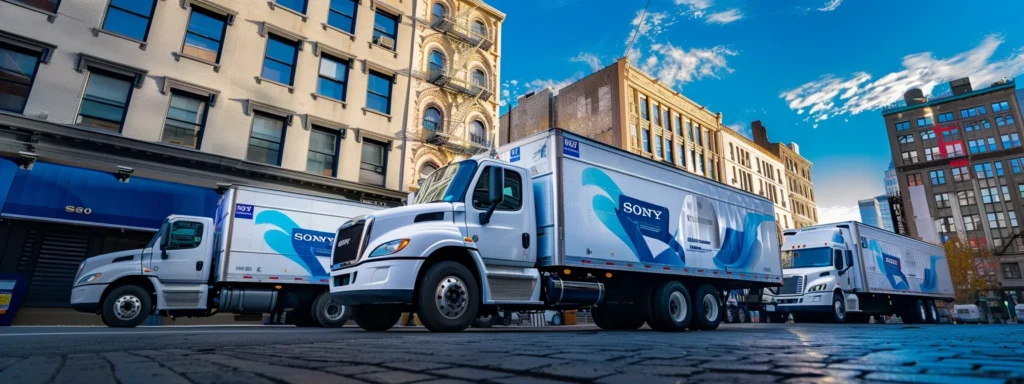Chiller Truck Features That Save You Money
Chiller trucks are essential for maintaining the quality of temperature-sensitive goods, but their operational costs can quickly add up. This article explores key features of chiller trucks that not only enhance efficiency but also provide significant savings. Readers will learn about energy-efficient cooling systems, cost-effective maintenance practices, and innovative technologies designed to lower operating costs. By understanding these aspects, businesses can effectively manage their expenses and optimize their logistics, addressing the common challenge of rising transport costs in a competitive market.
Understanding the Basics of Chiller Trucks and Their Efficiency

Chiller trucks serve a vital role in ensuring the quality of temperature-sensitive goods. Utilizing advanced refrigeration technology, these vehicles maintain optimal conditions for transporting perishable items through the cold chain. This consistent temperature control prevents spoilage, ultimately saving businesses money in damages and losses.
The efficiency of a chiller truck with tail lift is noteworthy, as it enhances loading and unloading processes. By providing easy access for workers, these trucks reduce turnaround time, making logistics operations more effective. This efficiency translates to lower operational costs and improved delivery schedules.
Energy consumption is a critical factor in the operation of chiller trucks. Modern refrigeration systems are designed to optimize energy use, balancing temperature control with lower energy costs. This efficiency not only decreases the carbon footprint but also minimizes expenses associated with fuel consumption.
Businesses rely on chiller trucks to meet compliance standards within the food and pharmaceutical sectors. Maintaining the integrity of cold chain logistics is essential, as regulatory guidelines often dictate stringent temperature requirements. Compliance through reliable transportation reduces the risk of fines and enhances customer trust.
Investing in quality chiller trucks results in long-term savings for companies involved in cold logistics. Durable vehicles equipped with state-of-the-art refrigeration systems require less frequent maintenance and repair. This reliability reduces downtime and ensures that businesses can confidently transport goods while controlling costs.
Energy-Efficient Cooling Systems in Chiller Trucks

Advanced insulation materials significantly enhance the efficiency of refrigerated vans, helping businesses maintain temperature control while minimizing energy costs. Programmable thermostats allow for precise temperature management, ensuring compliance during distribution. Variable speed compressors adapt to varying loads, optimizing energy consumption and reducing the overall carbon footprint of the fleet, ultimately resulting in substantial savings.
The Role of Advanced Insulation Materials
Advanced insulation materials play a crucial role in maximizing the efficiency of chiller trucks. By effectively minimizing heat gain from the outside, these materials help maintain the desired temperature within the refrigerated transport environment, ensuring that perishable items remain safe throughout their journey. This efficiency means that the compressor does not need to work as hard, leading to lower energy costs and enhanced performance during truckload deliveries.
The implementation of high-quality insulation can directly impact logistics operations for businesses reliant on temperature-sensitive goods. A well-insulated chiller truck supports consistent temperature control, which is essential for products like pharmaceuticals and fresh produce. This reliability not only enhances compliance with regulatory standards but also minimizes the risk of spoilage, ultimately saving companies money in potential losses.
Incorporating advanced insulation materials also results in a reduction in the wear and tear on the evaporator and compressor. As these components operate less frequently and at optimal levels, maintenance costs decrease, providing further savings for businesses involved in refrigerated transport. This durability is key for companies seeking dependable solutions that promote long-term financial benefits while ensuring the safe delivery of goods.
Programmable Thermostat Features for Temperature Control
Programmable thermostat features in chiller trucks streamline temperature control, significantly reducing the risk of spoilage during food delivery. By allowing truck drivers to set and adjust temperature schedules according to specific delivery windows, these systems ensure that products remain within ideal temperature ranges throughout the supply chain.
This advanced technology not only enhances the reliability of refrigerated transport but also helps companies maintain compliance with food safety regulations. A truck driver equipped with programmable thermostats can monitor conditions in real-time, swiftly responding to any deviations, thereby minimizing the risk of costly losses due to temperature fluctuations.
Moreover, the ability to customize settings according to different loads means energy consumption can be optimized, leading to cost savings. By reducing unnecessary energy use during transit, businesses can achieve a more efficient supply chain overall, contributing to their bottom line while ensuring the safe transport of perishable goods.
Variable Speed Compressors and Their Benefits
Variable speed compressors are an integral component of chiller trucks, particularly for maintaining proper food safety standards during the transport of sensitive items like meat. These compressors adjust their output based on the demand for cooling, ensuring that the temperature remains stable regardless of fluctuating pressure within the system. This adaptability significantly reduces the risk of spoilage, safeguarding both quality and compliance with health regulations.
In practice, the variable speed feature allows chiller trucks to respond efficiently to changes in freight loads. For instance, during lighter loads, the compressor can operate at a lower capacity, conserving energy and reducing fuel costs. When heavier demands occur, it ramps up to maintain the necessary temperature, ensuring that perishable goods arrive in optimal condition.
The benefits of using variable speed compressors extend beyond operational efficiency; they directly contribute to cost savings for businesses. By minimizing energy consumption while ensuring proper cooling during transport, companies can protect their investment in perishable goods. This technology not only enhances profitability but also promotes reliability in supply chain management, ultimately leading to increased customer satisfaction.
Cost-Effective Maintenance Practices for Chiller Trucks

Regular inspections and maintenance schedules are essential for preserving the functionality of chiller trucks, including box trucks and electric trucks. By addressing common issues early and implementing simple fixes, businesses can significantly reduce downtime, enhancing customer satisfaction. This section will cover the importance of consistent upkeep and offer practical solutions to maintain efficiency and lower carbon impact over the vehicle’s length of service.
Importance of Regular Inspections and Maintenance Schedules
Regular inspections and maintenance schedules are crucial for ensuring chiller trucks operate at peak performance. Businesses that prioritize these practices often experience extended shelf life for their temperature-sensitive goods. By addressing minor issues before they escalate into major repairs, companies can minimize unexpected downtime and maintain a consistent delivery schedule.
The functionality of key components, such as the alternator, is critical in maintaining the reliability of chiller trucks. Routine checks can prevent breakdowns that disrupt operations and compromise the safety of perishable items. This proactive approach not only enhances the operational efficiency of the fleet but also aligns with sustainability goals by prolonging vehicle lifespan and reducing waste from unnecessary replacements.
Implementing comprehensive maintenance programs allows businesses to create a smoother workflow while ensuring compliance with industry standards. These programs can be tailored to the specific needs of the fleet, emphasizing regular maintenance checks that enhance safety and reliability. Ultimately, investing in routine inspections safeguards valuable perishable goods, thus contributing to lower overall costs and improved customer satisfaction.
Common Issues and Simple Fixes to Reduce Downtime
One common issue in chiller trucks involves engine performance, which can directly affect fuel efficiency. Regularly checking and maintaining the engine ensures it runs smoothly and remains energy-efficient. Addressing minor engine issues early can prevent costly breakdowns and prolong the vehicle’s lifespan, ultimately saving businesses money.
Refrigerant leaks are critical problems that can compromise the integrity of the cold chain. Detecting and repairing these leaks promptly is vital to maintaining optimal temperatures for cargo. By ensuring that the refrigerant levels are stable, companies can avoid spoilage and unnecessary financial losses, supporting effective cold logistics.
Another area of concern is the axle system, which plays a significant role in the overall functionality of chiller trucks. A well-maintained axle enhances fuel efficiency and ensures the truck handles loads appropriately. By conducting routine inspections and addressing axle issues quickly, businesses can minimize downtime and maintain a consistent delivery schedule for their temperature-sensitive shipments.
Fuel Efficiency Strategies for Operating Chiller Trucks

Optimal driving techniques play a crucial role in conserving fuel for chiller trucks, particularly those transporting frozen food. Implementing innovations like telematics can greatly enhance efficiency by monitoring driving behaviors. Regular engine maintenance is essential for ensuring consistent fuel consumption. Together, these strategies form a comprehensive approach that can significantly reduce operational costs while maintaining the integrity of chilled transport.
Optimal Driving Techniques to Conserve Fuel
Implementing optimal driving techniques is essential for conserving fuel in refrigerated trailers. For instance, maintaining a steady speed and minimizing rapid acceleration can significantly reduce fuel consumption. This practice not only enhances the efficiency of the van but also supports regulatory compliance by lowering emissions, aligning with standards set forth by the California Air Resources Board.
Moreover, utilizing cruise control on highways can help drivers maintain a consistent speed, further improving fuel efficiency. By reducing unnecessary speed fluctuations, customers can benefit from lower operational costs while ensuring that temperature-sensitive goods remain safe throughout their journey. This careful driving approach can ultimately result in enhanced trust and satisfaction from clients.
Additionally, planning routes strategically can lead to more efficient driving, reducing the time spent on the road and the associated fuel expenses. By selecting the most direct and least congested paths, businesses can minimize delays and maintain timely deliveries. This not only improves efficiency but also demonstrates a commitment to customer service and compliance with industry standards.
The Impact of Regular Engine Maintenance on Fuel Consumption
Regular engine maintenance is crucial for optimizing fuel consumption in chiller trucks. When engines are well-maintained, they operate more efficiently, which directly impacts fuel savings. Simple tasks such as oil changes, air filter replacements, and spark plug inspections can prevent performance issues that lead to increased fuel usage.
Addressing engine performance proactively can also enhance the longevity of the vehicle. An engine that runs smoothly not only conserves fuel but also reduces wear on components, minimizing the risk of expensive repairs. By adopting a consistent maintenance schedule, businesses can avoid unplanned downtime and the associated costs of lost deliveries.
Moreover, a well-maintained engine contributes to overall safety and compliance with environmental regulations. Improved fuel efficiency means lower emissions, aligning with regulatory standards and enhancing a company’s reputation. By prioritizing engine maintenance, businesses can ensure their chiller trucks are both cost-effective and environmentally responsible, ultimately leading to significant savings over time.
Innovative Technologies That Lower Operating Costs

Remote monitoring systems offer businesses the advantage of real-time tracking for chiller trucks, allowing for immediate responses to temperature variations and potential issues. Utilizing IoT for predictive maintenance further enhances operational efficiency by predicting failures before they happen, enabling timely repairs and minimizing downtime. These technologies collectively contribute to cost savings while ensuring the safe transport of perishable goods.
The Advantages of Remote Monitoring Systems
Remote monitoring systems significantly enhance the operational efficiency of chiller trucks by providing real-time tracking of temperature and location. This technology allows for immediate responses to any temperature deviations, ensuring that perishable goods remain within optimal conditions during transit. For businesses, this proactive approach can prevent spoilage and costly losses, ultimately safeguarding their investments in temperature-sensitive items.
These systems also enable companies to monitor vehicle performance and fuel consumption, contributing to lower operational costs. By identifying inefficiencies and maintenance needs early, businesses can implement corrective actions before they escalate into significant issues. Regular monitoring not only ensures the reliability of the cold chain but also helps maintain compliance with industry regulations, further protecting business interests.
Incorporating remote monitoring into logistics operations offers the added benefit of data analytics. Businesses can analyze trends and patterns, which provide insights into operational performance and aid in optimizing future delivery routes. By leveraging this information, companies can enhance service efficiency and improve customer satisfaction, making the entire transport process smoother and more cost-effective.
Utilizing IoT for Predictive Maintenance
Utilizing IoT for predictive maintenance in chiller trucks significantly enhances operational efficiency and reduces costs. These systems continuously monitor critical components, such as refrigeration units and engines, enabling businesses to identify potential issues before they escalate into serious problems. By addressing minor repairs early, companies can avoid costly breakdowns and extend the lifespan of their vehicles.
The data gathered through IoT technology provides valuable insights into the performance of chiller trucks. For instance, analytics can reveal trends in fuel consumption and equipment wear, allowing businesses to optimize their maintenance schedules accordingly. This proactive approach not only improves reliability but also ensures compliance with industry standards, protecting the integrity of the cold chain.
Implementing IoT solutions also contributes to more effective resource management. With real-time monitoring, businesses can adjust routes and operational practices based on actual vehicle performance, leading to significant savings. This capability helps companies maximize their investments in refrigerated transport while ensuring timely deliveries of perishable goods in optimal condition.
Best Practices for Maximizing Chiller Truck Lifespan

Regular upgrades play a crucial role in maximizing the lifespan of chiller trucks, helping to prevent costly repairs down the line. By leveraging warranty options for repairs and service, businesses can protect their investments and ensure continual operational efficiency. The following sections will provide practical insights on these strategies, highlighting their importance in reducing long-term expenses.
How Regular Upgrades Can Prevent Major Costs
Investing in regular upgrades for chiller trucks can significantly reduce long-term operational costs. By keeping up with the latest refrigeration technologies and improvements, businesses can enhance energy efficiency, which lowers fuel expenses. For instance, replacing outdated compressors with modern variable speed models can lead to notable energy savings during transport.
Moreover, conducting timely upgrades ensures compliance with evolving industry standards. As regulations in the cold chain logistics sector become more stringent, upgrading equipment can prevent potential fines and increased scrutiny. By maintaining compliance through proactive measures, businesses not only protect their reputation but also safeguard their financial investments.
Lastly, focusing on regular upgrades fosters a reliable fleet capable of consistently delivering temperature-sensitive goods. A well-maintained truck experiences fewer breakdowns, which minimizes unexpected repair costs. This reliability supports an efficient logistics operation, ultimately enhancing customer satisfaction and loyalty while optimizing the overall investment in chiller truck features.
Leveraging Warranty Options for Repairs and Service
Utilizing warranty options for repairs and service can greatly extend the lifespan of chiller trucks, ultimately leading to significant cost savings. Businesses should carefully review warranty agreements to understand coverage details, ensuring that repairs are completed without incurring out-of-pocket expenses for common issues. This proactive approach not only protects their investment but also minimizes disruption to operations.
When companies leverage warranty options, they gain access to networked service centers, which often offer quicker response times and specialized expertise in chiller truck systems. Regular maintenance covered under warranty allows businesses to avoid costly breakdowns, ensuring that their refrigerated fleet remains operational and compliant with industry standards. By prioritizing these maintenance schedules, they can enjoy reliable service and mitigate the risk of spoilage.
Moreover, businesses can benefit from warranties that cover upgrades and new technology, such as energy-efficient refrigeration systems. By embracing these advancements, companies not only enhance performance but also reduce their carbon footprint and fuel costs. This integration of innovative features leads to a more effective cold chain process, aligning with sustainability goals while optimizing financial resources.
Conclusion
Chiller truck features like advanced insulation, programmable thermostats, and variable speed compressors significantly enhance operational efficiency while minimizing costs. These technologies not only maintain optimal temperature control for perishable goods but also reduce energy consumption and maintenance expenses. By investing in these critical features, businesses can protect their perishable investments and improve overall logistics performance. Embracing such innovations positions companies to thrive in a competitive marketplace while ensuring reliable and cost-effective transportation solutions.



